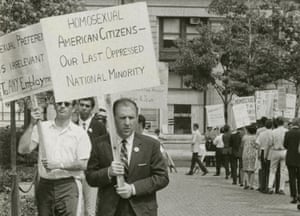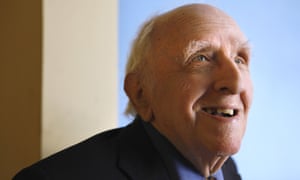Eric Cervini’s story of one man’s struggle touches on many others and leaves the reader wanting 500 pages more

Photograph: PBS
Trained at Harvard and Cambridge, Eric Cervini is an LGBTQ historian. His debut, subtitled The Homosexual vs the United States of America, falls short of perfection. But not by much.
The book relates the 86-year life of Franklin Edward Kameny, an astronomer turned gay rights activist. Primarily, it concerns a decades-long campaign to combat discrimination against gays in the workplace and US military. Ultimately, by outlining similar struggles among gays, blacks and others oppressed by prejudice and patriarchy, it does far more.
In 1957, following arrest for “lewd conduct” in a San Francisco “tea room”, Kameny lost certification to work for the Department of Defense in Hawaii. Ordinarily cautious, he made a risky decision. He resolved to come out, in order to fight the federal government.
With spare prose and linear sequencing that recalls James Baldwin, Cervini chronicles this mission, unsuccessful appeal after unsuccessful appeal. He takes the reader on an epic journey. One visits bureaucratic tribunals, the supreme court, the halls of Congress. An early ally is the black representative Robert Nix, of Philadelphia. White House meetings follow demonstrations in the streets.
To convey respectability, Kameny’s marchers were strictly choreographed and costumed. Among them, Ernestine Eppenger was conspicuously anomalous. Sensing lesbians and the transgendered were not a priority, she soon left for the Black Freedom Movement.
Kameny’s fight was successful. But winning came at a terrible cost.
Soon after Russia’s launch of Sputnik, his special skills were needed. But a charge that homosexuality made him vulnerable was exacerbated by the hysteria of McCarthyism. Never again did the Harvard-trained scientist, the son of eastern European Jewish immigrants, gain long-term employment in his field, or even the barest financial security. He was among the first Americans to insist that “gay is good”, to admit to being sexually active but well-adjusted, but he never found the fulfillment of an enduring relationship.
Kameny gained something else of value. More and more, gay rights activism consumed him. Helping found the Washington branch of the Mattachine Society, he also orchestrated the Washington ACLU’s defense of innumerable discrimination cases like his own. Initially, these court battles ended in failure. But with tireless lobbying, strategically placed press, cross-country lectures and radio and TV appearances, he persevered. Kameny’s endeavors went a long way towards challenging negative stereotypes while fostering pride. His leadership led to victory.
Gays were up against the same societal disdain and hostile legal system faced by blacks and Jews, buttressed by centuries of religious bigotry. Loathed more than other groups, most gays were temporarily protected from worse treatment by an ability to deny their true identity. But the threat of exposure, from police entrapment, scorned lovers, colleagues, neighbors or rivals, was ever-present.
Cervini shows how, again and again, Kameny’s homophile movement emulated African Americans’ efforts to achieve civil rights.
Appearing in 2010, the Harvard scholar Khalil Gibran Muhammad’s The Condemnation of Blackness: Race, Crime and the Making of Modern Urban America, was a revelation. From the end of slavery to the mass incarceration of today, African Americans were systemically scapegoated as a criminal class. Jews and European immigrants, encountering genuine bias, were never defamed as harshly. Sharing whiteness, they were gradually accorded civil rights, less due to merit than assimilation.
The Deviant’s War is a similarly epiphanic work. That is due partly to Cervini’s admirable use of a wealth of material. His sources included the Kinsey report, the FBI director J Edgar Hoover’s newly declassified “Sex Deviates” computer program, and interviews with activists like Larry Kramer, who worked doggedly during this epoch of seismic change, toward the dawning of a better day.
Testimony from participants in the 1969 Stonewall riots brings that definitive act of gay defiance to life. It was both more diverse and more bloody than the picture nostalgia, a half-century later, usually conjures up. Stonewall shows how sometimes, after peaceful protests fail, destruction of property can focus attention and lead to lasting action.
Is it due to academic rigor that Cervini fails to mention Hoover’s long-rumored intimacy with his deputy, Clyde Tolson? Perhaps he felt most readers would already be aware of such speculations.

A more significant issue is the book’s end. Reminiscent of Tom Wolfe’s The Bonfire of the Vanities, it is a summation in the form of an epilogue. Snappily, one learns the resolution of the myriad lives populating The Deviant’s War. But after earlier thoroughness, one yearns for 500 pages more instead.
White supremacy is America’s fatal malady. No one is immune. Once, a friend from a distinguished Chesapeake family, educated at Yale, remarked that African Americans, disproportionately arrested and jailed, were routinely poorer because we were “more wicked and lazy than whites”. Faced with the stark black-white wealth gap, the terrible treatment of so many people of color by police, momentarily I wondered: “Is he right?”
That’s one way I know I have been harmed by American inequality. Such illogic has robbed society of women who would make excellent presidents, gays who are outstanding footballers, blacks who are architectural historians, and more. In my case it has led, at one time or another, to depreciation of all who are marginalized, including myself. And so, each day, even while evaluating The Deviant’s War, I am vigilant against hidden unfairness.
Square jawed, film star-handsome, Cervini exhibits a facile charm. Before reading The Deviant’s War, I wondered: “How can someone so young, so attractive, have written a book that might be considered important?” My expectations were low.
I did not anticipate that in writing about Frank Kameny’s heroic stand, Cervini could also cover his own, mine and that of all LGBTQ America. Certainly it was hard to imagine, beforehand, a work that grippingly told of the emergence from turmoil of a more perfect union that is now threatened anew.
Cervini’s is a singular accomplishment. It proves one cannot judge a book by its cover, its outward identity. Seeking always to treat others justly, we ought never to do so. Happy Pride!



